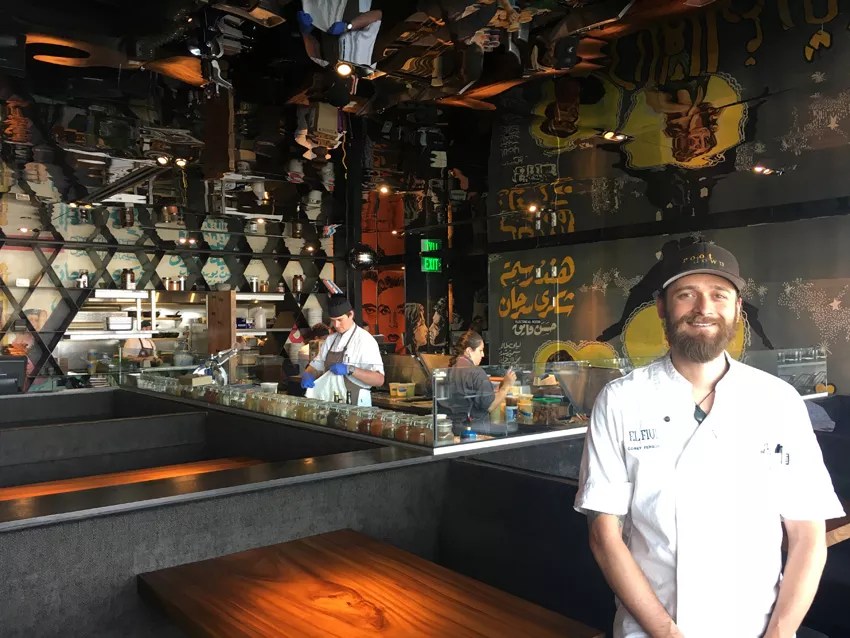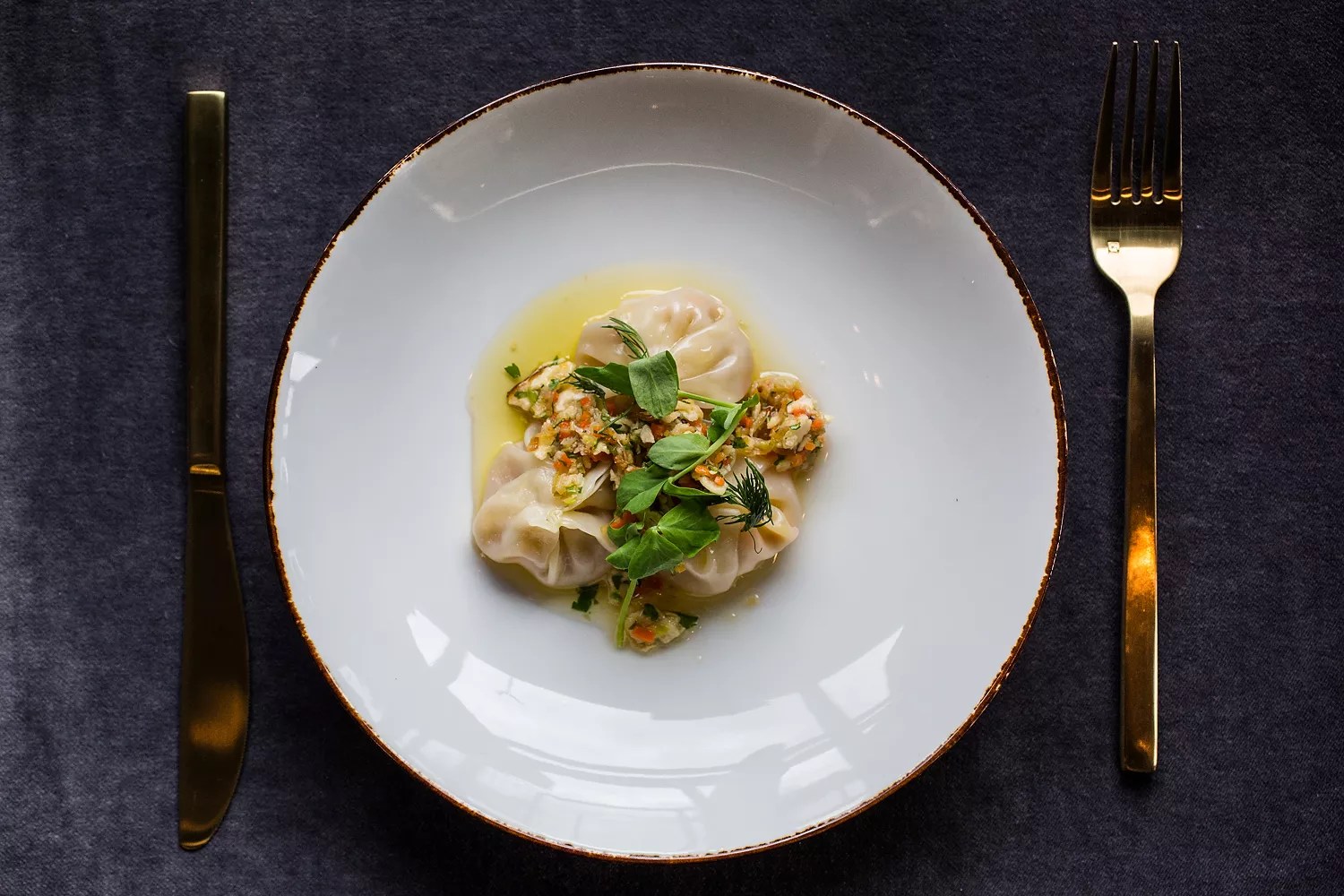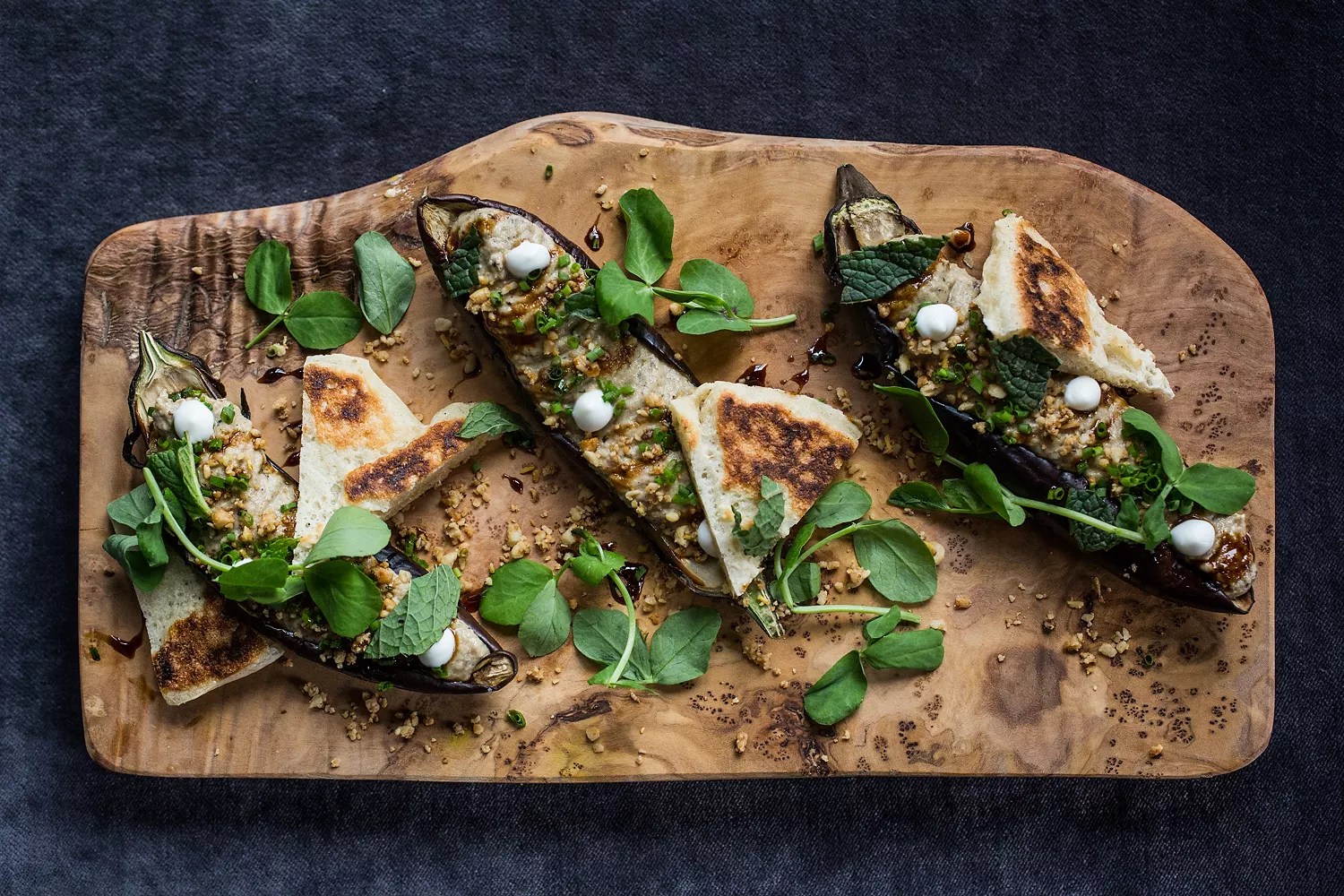
Laura Shunk

Audio By Carbonatix
Corey Ferguson realized early on that he wanted to cook food that supported local agriculture. A stint at a holistic-health institute in California taught him the connection between ecology and what’s on the plate; a year in Spain showed him an agricultural system where people are immensely proud of local products. When he returned to Colorado six years ago, he knew he wanted to work with restaurants that had a similar philosophy. He landed at Justin Cucci’s Root Down and has been with Edible Beats ever since. He’s now running the kitchen at El Five, applying Cucci’s penchant for quirky textures and flavor combinations to food from Spain, Northern Africa and the Middle East. Here he talks about a transformative evening in Basque Country, why it was important for him to be grounded in agriculture, and why smart chefs are happy to accommodate food allergies.
Corey Ferguson: My very first job was at Subway, when I was fifteen. I’ve never left the kitchen since; I had a fascination with creating. Cooking was just canned vegetables and fruit when my mom cooked, so it was nothing crazy. I found my own way into creating food I like to eat. Once I was eighteen, I got my first real kitchen job, at an Italian bistro in Fort Collins. The chef grew up cooking in New York – he’d lived that lifestyle – and he turned me on to cooking. He got me into literature, famous chefs, techniques. The greatest thing he ever said to me, though, was that if he [could have] done one thing differently, he would have gone to the Culinary Institute of America. So I went out [to Hyde Park] when I was nineteen, got my associate’s degree, and started finding who I was in terms of food and environment.
After that I went to Big Sur, California, to the Esalen Institute, a holistic-health institute. I fell in love with the connection between food and agriculture, with what food is on a spiritual level. I’ve always been around agriculture – growing up, I went and branded cattle in Sedgwick County every year. I always had a ton of buddies who were farmers or ranchers. At Esalen, I got to work on a farm, and I learned a lot about people and management. Most people I was leading in the kitchen had never set foot in a kitchen before – they’d worked in gardening or landscaping. I got to understand people, their capabilities, and to work as a group that had never worked together to feed 400 people three times a day. It was a growing experience for me personally. I got really into agriculture and food ecology and started putting a lot of my energy there. Once I went from viewing things separately to viewing them as a whole is when I understood the importance and personal desire of making sure I was grounded in both cooking and farming. It was the most direct relationship you can imagine in farm-to-plate. To this day, I would do that all the time if I could. Esalen was such a turning point for me; it took separate ideas I had and united them from an intellectual and spiritual standpoint. It will forever be the point where I realized what I wanted to do. I was not so much about going to work for [Daniel] Boulud or someone in New York City after that – that didn’t interest me. I wanted to learn about food from the base level.

Matzah-ball soup dumplings.
Danielle Lirette
I went back to the CIA to get my bachelor’s degree, then stumbled on a job in Marlborough, New York, at this place called the Falcon. It was a jazz club, and the owner needed a little revenue – otherwise, he was putting on these for-donation shows. The guy owned half the city, but he didn’t know anything about running a kitchen, or care. He put me and my buddy (we were 22 and 25) in charge of starting up his kitchen. It was a huge learning experience. I didn’t know what I was doing, but I fell into an executive-chef role. I started dabbling and working with local farmers, making really simple food. I was there for two years; it was an amazing opportunity, but not the food I wanted to be cooking or a place I wanted to be. I was a hippie kid from Fort Collins. New York didn’t do it for me.
I got to go to Spain after that – a month-long tour was the final thing I did at the Culinary Institute. I went to Asturias, next to the Basque region, and worked on a farm out there. Spanish culture and food is where I want to be and what I want to be eating. It is such a community-driven style of eating, and there’s such a community-driven style around food and agriculture. I was seeing a side of agriculture that is basically nonexistent in our country anymore. There, if you’re a small farmer, you go to the grocery store and sell your produce. There are no contracts, no one saying, “That doesn’t look good enough.” There’s support on a very local level to get food from the area, so people are so proud of things they grow, the cheeses they make, the spirits they brew.
Basque region is cider country, and the most exciting thing I got to do was to go to this big cider house. There were barrels up to the ceiling of different ciders. They grow 300 types of apples, and most of them suck to eat, but they’re wonderful cider apples. So I go in, and people start floating in until there are 250, 300 people in this room. There are picnic tables wall to wall, and the small plates start coming out. Cheese, meats, eggs. Then a guy comes out, the cider master – he has the key to all the barrels. He’ll open a barrel and there’ll be a flood of cider, no spigot. You line up with your cup, fill up your cup, then go back to the end of the line. Pretty soon, more food comes out. In Spain, never do you feel isolated – you’re always invited in. There are no egos, nothing hoity-toity. People come together to celebrate food that’s around them, wine that’s around them. It’s a very simple way of living and enjoying food and company that I found very appealing.

Hummus served inside roasted eggplants at El Five.
Danielle Lirette
I knew I had to come back eventually and start a career. There were really only two restaurants in the city of Denver that matched my philosophy and that I wanted to work for, and they were Fruition and Root Down. I started a dialogue with Justin Cucci while I was still in Spain. When I moved to Denver six years ago, he had open arms waiting for me – that was incredible. I met Daniel Asher and really vibed with him on so many levels. He got me a lot of great connections right off the bat. Root Down is where I found my style of cuisine – where I learned to find what’s in season, fresh and local, and build dishes off of that. Everyone has their own version of what farm-to-table is, but building those relationships in the community between farmers, that’s what I was passionate about. I got to see businesses and farms grow, see people get out of hard times because of our support. I loved Root Down because it was a true seasonal restaurant. It was a huge part of my culinary journey. I quickly moved through the ranks to become sous-chef, then chef de cuisine, then executive. I was there for five years.
El Five started coming into talks three years ago. At first we were going to do Spanish tapas the Edible Beats way. I threw my name in the ring immediately. As we got closer, we decided to expand to the entire Mediterranean – the Middle East and North Africa. I can make Spanish tapas all day, but those were things I didn’t know much about, so I went diving back into books and trial and error. Edible Beats style is about taking things everyone knows and then using weird, fun ingredients or weird flavor and texture combinations that don’t necessarily make sense when you’re talking about them. But then you put them on the plate, and it’s like, no wonder we listen to Justin. I’m someone who’s traditionally trained, and that’s still where my flavors come from. But he picks fun ingredients and says, what can I do with an avocado that no one’s done before? What’s a mulberry? How can we get this on the menu? He’s constantly searching for new things, and working with him, you start finding those ingredients and textures, too. He’s an out-of-the-box guy who’s constantly searching – and to make him happy, you have to be constantly searching, too. I don’t think I’ll ever fully understand, but I understand bits and pieces at a time, and it’s a collaborative experience: By the end, everyone is really happy with what’s on the plate, because everyone has had input, everyone has agreed, and we can translate that to the front of the house, to the guest. Two months in, El Five feels like a restaurant that’s been running six months.

Ash-roasted carrot salad.
Danielle Lirette
Part of what drew me to the company is its focus on vegetarians, vegans and health. Working out at the Esalen Institute, every single meal had to have a vegan option and a regular option; it became second nature to me to think about making food for someone who can’t have gluten or is vegan. You can go to every one of our restaurants and have a phenomenal vegetarian, gluten-free meal. That’s how we develop menus – we say, how can we make this delicious for someone who can’t have meat, dairy, garlic, onion? We have allergy books in every location, and we update them on a weekly basis. We put a tremendous amount of energy into it, but it ultimately pays off. We had a couple come in two weeks ago who have been dining at Root Down for years now. They hand you a page of everything they can’t eat, which is basically anything on the menu. But they come to these restaurants because they know we’ll create an amazing meal based on their dietary needs. They normally have to cook for themselves. It’s about getting those people in and stopping the negativity that goes along with that. I don’t like it when people say, that’s not an allergy, they just don’t like garlic. It doesn’t matter. [Catering to dietary needs] is a skill, and it’s not something every chef can do. But that’s something Justin has done since he opened Root Down. We try to make this as accessible to the community as we can. Due to our industrial agriculture and food system, that’s what diners are like now, especially in Denver. We would not be intelligent businesspeople to shut our doors to anyone.
When I first got here, I was working with Denver Urban Gardens, teaching a class on cooking, nutrition and gardening for fifth-graders with Judy Elliott. I started doing stuff with the Denver Botanic Gardens and Johnson & Wales, exploring the educational piece of what we’re doing here, and how we communicate that to growing chefs and kids with no resources. The sustainable-agriculture movement is as grassroots as it was in the ’70s and ’80s, but there’s a large group of chefs driven to support Colorado agriculture, which is amazing for a state that has such a short growing season. In Fort Collins, growing up, we would have laughed at artisanal cheesemakers. Now there are several, and they’re doing great. I’m always a pessimist and optimist about this at the same time. It’s an education thing – it’s about teaching kids, chefs, farmers how to make those decisions. I hope for the best and do what I can to guide people to those choices.
El Five
2930 Umatilla Street, Fifth Floor
303-524-9193
elfivedenver.com
Hours: 5 to 10:30 p.m. Tuesday through Sunday